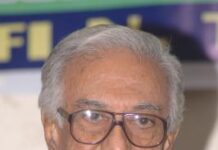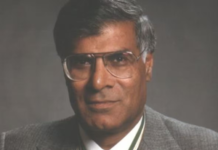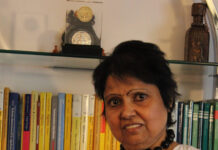Lahore– Doughty Pakistani human rights activist Asma Jahangir, who fought her battle on the streets as well in courts, opposed military strongmen and steadfastly championed the rights of women, minorities and LGBTs, passed away here on Sunday. She was 66.
According to Geo TV, Jahangir, the first woman President of the Pakistan Supreme Court Bar Association, was shifted to a hospital on Saturday night after suffering cardiac arrest. She died while undergoing treatment.
While condolences poured in from all sections, there was a section on people who condemned her even after she passed away.
Born on January 27, 1952 to a progressive family in Lahore, Jahangir’s path seemed set out with her father Malik Ghulam Jilani, a bureaucrat-turned-politician, opposing corruption at the fag end of Ayub Khan’s rule and the brutal crackdown in then East Pakistan under Yahya Khan following the 1970 election.
After her graduation from the prestigious Kinnaird College and LLB from the Punjab University in 1978, she hit the headlines when she enthusiastically jumped into the Movement for Restoration of Democracy (MRD) against the Zia ul-Haq dictatorship and was jailed.
In 1987, she co-founded the Human Rights Commission of Pakistan and became its Secretary General until 1993 when she was elevated as its chairperson. She represented several clients who were denied their fundamental rights and defended cases of minorities, women and children in prisons.

A mother of one son and two daughters, Jahangir was also the co-chair of South Asians for Human Rights. She was appointed UN Special Rapporteur on Extrajudicial, Arbitrary or Summary Executions and later as the UN Rapporteur of Freedom of Religion or Belief.
She often had a tempestuous relation with the Pakistani state. While she received several national awards, including the Sitara-I-Imtiaz in 1995, Jahangir was again put under house arrest in November 2007 after President Pervez Musharraf imposed Emergency.
She penned two books — “Divine Sanction? The Hadood Ordinance” (1988) and “Children of a Lesser God: Child Prisoners of Pakistan” (1992).
In recognition of her services in the field of human rights, Jahangir was awarded the American Bar Association International Human Rights Award in 1992, the Martin Ennals Award and the Ramon Magsaysay Award in 1995.
Prime Minister Shahid Khaqan Abbasi led the nation in paying tributes, terming her demise a great loss for the legal fraternity while President Mamnoon Hussain, Chief Justice of Pakistan Saqib Nisar along with other politicians, lawyers and journalists also expressed grief.
Punjab Chief Minister Shahbaz Sharif tweeted: “Pakistan has lost a passionate champion of human rights and a staunch supporter of democracy…”
Daily Times Editor Raza Ahmad Rumi called her a “hero”.
“‘Speaking truth to power’ a phrase, we often use. Asma Jahangir lived, practiced till her last breath. Questioned mullahs, military, judges, politicians… defended downtrodden. Faced threats and attacks. Was never afraid. What a hero,” he tweeted.
Journalist Naila Inayat, termed her death “the end to an era” while Mehreen Zahra-Malik, another journalist, tweeted: “A male friend once asked: why is Asma Jahangir always so angry? What disturbed him perhaps was why she always spoke up and appeared utterly unafraid in this world dominated by masculinity’s apoplectic id. For me, this is what Asma Jahangir was: she was brave enough to be angry.”
As one Twitter user called her the only “man” in Pakistan, author Bina Shah contested it, saying: “The only man? She was fully a woman in her courage and steadfastedness. A lioness. You don’t get to claim her for your own gender.”
Ziauddin Yousafzai — the father of Malala, Pakistani activist and the youngest Nobel Prize laureate — said Jahangir deserves a state funeral while Indian poet Javed Akhtar called it the loss of the whole subcontinent.
However, there were some who termed her a hypocrite, a traitor – posting a picture of her receiving an award from Bangladesh Prime Minister Sheikh Hasina – and even an “Indian agent”.













